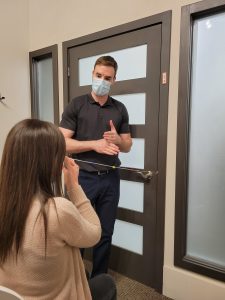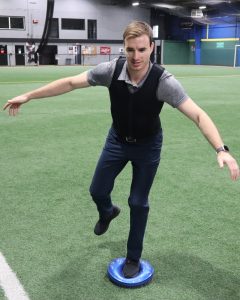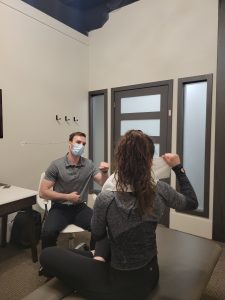Concussion Treatment and Management



Complete Concussion Management
Concussion Care requires a high degree of skill, time, and treatment capabilities. Modern Chiropractic clinicians are leaders in this capacity and Pro Function is very fortunate to have Dr. Joseph Greenwood available in London Ontario. Concussion Chiropractors are always in high demand so availability may be limited.
A Concussion is a mild form of a brain injury that temporarily changes how your brain works. It occurs when your brain undergoes acceleration or deceleration within your skull, resulting in an over-stretching of your brain nerves.
In the first few days after a concussion, your brain burns through a ton of its own energy as it attempts to heal itself. A the same time, your brain is less effective at creating fresh energy to recharge itself. this leads to your brain being in a state of low energy, making simple and everyday tasks much more challenging. Symptoms are often more prevalent during this stage of recovery.
Can concussion can occur after an impact to your head or elsewhere on your body.
You can get a concussion even if you didn’t hit your head? – Yes! If enough force is put into your body (ie Hockey hit to your shoulder or seatbelt strap to your chest in a car accident), your neck may move through a whiplash motion, causing your brain to accelerate or decelerate within your skull, resulting in a concussion.
Concussion symptoms fall into 4 categories: PHYSICAL, THINKING, EMOTIONAL, and SLEEP.
It is important to remember that every concussion is different. The symptoms that you experience may differ completely from somebody else. If you experience any of these symptoms after an impact to your head or body, suspect a concussion:
PHYSICAL – headache, neck pain, sensitivity to light/noise, visual problems, dizziness, balance issues, nausea, vomiting
THINKING – memory issues, difficulty concentrating, confusion, feeling slowed down, feeling in a fog, trouble thinking clearly
EMOTIONAL – anxiety, nervousness, depression, sadness, irritability, more emotional
SLEEP – fatigue, low energy, sleeping more or less, trouble falling asleep
If you suspect a concussion, your priority is to be assessed by a medical professional trained in concussion management. While you wait for your assessment, it is important to monitor for RED FLAGS. The presence of any RED FLAG may suggest a more serious injury, such as a brain bleed or skull fracture.
Immediately go to the emergency department if any of these signs or symptoms are present:
Seizures or convulsions
Loss of consciousness
Weakness or numbness in arms or legs
Unable to wake up
Worsening headache
Bad nausea or repeated vomiting
Increasing confusion
Unsteadiness with standing or walking
Bruising around eyes or ears
Odd behaviour
Slurred speech
Inability to remember injury
After being assessed by a medical professional to rule out RED FLAGS related to more serious injuries, concussion management can begin.
The first days after your concussion injury are vital to your overall recovery. It is important to find a health care practitioner that can provide specific recommendations that meet your lifestyle and answer all of your concussion related questions.
DO’s
REST
A concussion results in a significant drop in brain energy. It is important to rest for 48-72 hours. After this, it is beneficial to increase your daily activity levels. Your health care practitioner will provide you with specific instructions.
SLEEP
Once you have been assessed and no red flags are present, sleep is necessary for recovery. It is also okay to nap during the day.
I thought you weren’t supposed to sleep after a concussion? – It is important to prevent a concussed person from going to bed immediately after a concussion. In the initial hours after a concussion, it is necessary to monitor for red flags or worsening of symptoms, as this may suggest that a more serious injury occurred. If a person is sleeping, you cannot observe for changes in their condition. Observe a patient for a minimum of three hours after a concussion.
PROPER DIET
Concussions result in a drop in energy. Providing your body with excellent food sources can help fuel your body and assist in recovery. Try to avoid poor food sources, such as processed foods high in refined sugars.
STICK TO THE GUIDELINES
School, work, and sport all have step-by-step protocols to help you return in a timely manner. Following these steps increases your chances of returning successfully without experiencing constant setbacks.
DON’Ts
PLAY SPORTS
Continuing to play sports with a concussion is dangerous and can lead to worse injuries. Before returning, clearance from a medical profession is necessary.
WORK or STUDY
Taking time away from work or study can help reduce initial symptoms and allow for further improvement. Discuss a plan for returning to these activities with your healthcare practitioner.
DRIVE
Avoid driving for at least 24 hours. It is best to wait until you begin to feel better.
DRINK ALCOHOL or TAKE DRUGS
Avoid substances that may mask how you are feeling.
The great news is that approximately 70% of people with a concussion will make a full recovery in 22-45 days. The unfortunate news is that the remaining 30% of people will experience symptoms for a longer period. Even worse is that 18-24% won’t be fully back to work by 6 months.
Why do some people recover quicker than others? – There may be underlying differences between people who improve quickly and those that take longer. Often, those who are in a better mental and physical state and follow the proper steps earlier in their recovery perform better.
Regardless of where you are at in your recovery, our goal with concussion management at Pro Function is to keep you and your recovery in that ‘70%’.
These are common feelings to have, especially early in your recovery. When experiencing a concussion, your nervous system, specifically your sympathetic nervous system, often becomes heightened and overactive. This can lead to one or more of:
- Fatigue
- Sensitivity to light/noise
- Trouble sleeping
- Trouble digesting
- Lack of focus
- Trouble concentrating
- Poor mood
Calming your nervous system is crucial before tackling other problems related to concussion. Rest, breathing exercises, and meditation can be effective strategies. Discuss a plan for implementing these tools into your daily routine with your healthcare practitioner.
Return to school, work, sport protocols are specific guidelines that have helped individuals that are recovery from a concussion have an easier and more successful return in a timely manner.
They consist of step-by-step, gradual progressions, ranging from easy to more challenging activities to better assist in your transition back to full school / work / sport.
Don’t make the mistake of trying to jump straight back into your everyday activities, as this may lead to a rise and return of symptoms.
At Pro Function, you will meet with Dr. Joseph Greenwood. Dr. Greenwood is a Chiropractor with a strong focus on helping those with both new and old concussions.
Is your balance off? Do you feel dizzy when you move your head too much? Are you having a hard time concentrating? Does exercise make your headaches worse? Dr. Greenwood will answer all of your concerns as well as teach you ways in which you can begin to help yourself feel better.
Some of the assessments Dr. Greenwood will use to determine how your brain in functioning include:
- Balance
- Neurological Screening
- Neck and upper back for whiplash
- Head and eye movements (using the vestibular ocular motor screen)
- Exercise capacity (using the Buffalo Concussion Treadmill Test
After a thorough assessment and discussion of the outcomes of the testing, Dr. Greenwood can then provide you with many therapies tailored to what you need to fully recover from the concussion. These may include:
- Muscle and joint therapy
- Vestibular (sense of balance) exercises
- Visual tracking and gaze stabilization exercises
- Habituation exercises (getting comfortable with noises/lights/crowded environments)
- Physical exercise guidelines
- Acupuncture and postural taping
- Step by step ‘Return to work or school’ protocols
- Step by step ‘Return to activity or sport’ protocols
- Co-management with additional health care practitioners.
Yes. It’s never too late to begin (or continue) therapy for a concussion. While it can be more challenging to make improvements the longer you have had symptoms, it is not impossible. This is especially true if you have not undergone specific concussion management and rehabilitation.
But what If I have already tried some therapy? – Just because certain treatments didn’t work in the past, doesn’t mean they won’t be beneficial now. Using different techniques, as well as combining multiple therapies together, may lead to greater results than what you achieved in the past. My #1 advice – don’t give up!
There is more to recovering from a concussion than rest, rest, and more rest. There is definitely more you can do than simply sitting in a dark room.
Concussion management, for both new and old concussions, pivots around 5 pillars.
- Calming hyperactive nervous system
Following a concussion, your nervous system is likely overactive. In order to be successful with rehabilitation, your nervous system has to relax. Many tips and tricks exist for priming your brain and nervous system to improve.
- Exercise and Diet Education
Concussion results in an energy deficit within your brain. In the early days, your brain is using up a large amount of its energy to recover. You must make sure that you are supplying enough fuel, via proper food and blood supply (appropriate exercise) to allow it to bounce back. Good diet and light aerobic exercise that does not increase symptoms can significantly help in your recovery.
- Manual Therapy and Neck Rehab
With every concussion, there will be a whiplash injury to the neck. This is one area that is often overlooked in the recovery process. Many symptoms, such as headache and dizziness, can stem from injuries to neck muscle and joints.
- Vestibular and Visual Rehab
70% of individuals with a concussion report having vestibular and/or visual problems. These can be experienced as:
- blurred vision
- eye strain
- trouble with reading
- light sensitivity
- balance problems
- trouble with quick head movements
It is important to have a detailed assessment to determine if any underlying issues exist.
- Education and Reassurance
How many times have you left a medical office with unanswered questions? Let’s not repeat this process.
The goal at Pro Function is to ensure that you truly understand why and where your symptoms are coming from and how we can work together to improve your outcome.
It’s understandable that you have questions. Recovering from a concussion can be confusing and stressful, especially if you have never gone through it before. It’s normal to feel anxious and overwhelmed. During your appointment, Dr. Greenwood will take the time to answer all of your concerns, as well as provide you with handouts and follow up emails recapping your appointment (as remembering can be difficult with a concussion).
If you would like to book an appointment online you can do so below. Alternatively you can call our office at 519-860-5090 to reserve your appointment. We look forward to meeting you.


